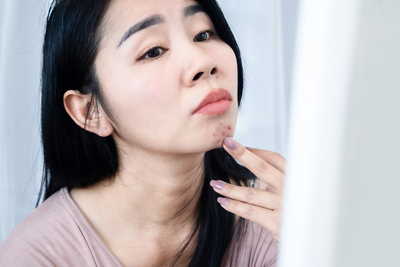Adult Acne Solutions: How to Deal With Hormonal Acne

New York dermatologist Dr. Jeremy Fenton explains how to treat adult acne in women, and why acne breakouts at this older age are still common.
“Adult female hormonal acne is a very common problem,” says Dr. Jeremy Fenton, a dermatologist at Schweiger Dermatology Group in New York City and Long Island. “Hormones play a role in acne to some extent in everybody, but adult women can sometimes have a type of acne that is primarily driven by their hormones.”
Some of the most common areas for breakouts in adult women that indicate that it’s hormonal acne include cystic acne along the jawline or chin area and acne that flares in sync with a menstrual period.
Hormonal acne is generally driven by androgens (a category of hormones often referred to as the male sex hormones).
Diet and Lifestyle Tips to Prevent Acne
Dr. Fenton’s Top Tip: Reduce Dairy Intake
Particularly fat-free dairy! Studies have shown that dairy can worsen acne, as hormones play a role in acne breakouts.
It isn’t exactly clear why, but dairy has been shown to affect both testosterone and estrogen levels in people who consume it, both of which can affect acne. Dairy also naturally contains its own hormones, such as estrogen, which can exert their own impact on a person’s hormonal balance.
The impact of dairy on acne may be through a variety of pathways, including:
- Stimulating the body’s inflammatory signals.
- Altering the balance of hormones such as insulin, testosterone, and estrogen.
- Ingestion of hormones such as estrogen produced by dairy cows.
Fat-free dairy seems to be worse than full-fat dairy. This is possibly due to the faster rate of absorption by the body or because removing the fat from dairy leaves it with a higher concentration of other components that are bad for your skin.
Dr. Fenton’s Top Tip: Reduce High Glycemic Foods
Other foods have been linked to acne and worsening inflammatory conditions as well. For example, high glycemic load foods. Therefore, if one wants to try a new diet to improve their acne, in addition to avoiding dairy, avoid refined flour, sweets, and processed carbohydrates.
Again, the exact mechanism isn’t known for certain, but we believe that these refined carbs lead to an insulin spike, which causes a hormonal cascade that can increase inflammation and oil production.
Dr. Fenton’s Top Tip: Reduce Stress
Stress triggers the release of a variety of hormones that can trigger an inflammatory response in the body. Inflammation is a major cause of acne. It is what leads to those large and deep red cystic pimples.
Anything you can do to reduce inflammation will be helpful for your acne. Get plenty of sleep, exercise, and practice relaxation techniques.
Dr. Fenton’s Top Tip: Birth Control Pills for Acne Treatment
Oral contraceptive pills (OCPs) can help women regulate their hormones, including those that are responsible for acne.
Certain OCPs have also been approved by the FDA to be used in the treatment of acne.
If you are already on birth control or thinking of going on it, make sure to ask your gynecologist for an OCP that will also help your acne.
Dr. Fenton’s Top Skincare Tips
For topical skincare acne treatments, stick with more gentle treatments. Women with adult female hormonal acne can cause their acne to flare if they are too aggressive with the topicals.
You can start with an over-the-counter (OTC) acne wash or topical gel that contains salicylic acid or glycolic acid. This will help remove the dead skin cells and clear out pores.
If your skin can tolerate it, an OTC benzoyl peroxide gel or wash can also be helpful for its antibacterial properties. Some prescription topical medications such as Winlevi and Aczone tend to work well with hormonal acne.
You can also try the OTC adapalene gel nightly.
Finally, stick with non-comedogenic moisturizers that are less likely to clog your pores.
Have more questions about your acne condition?
Dr. Jeremy Fenton is a board-certified dermatologist at Schweiger Dermatology Group in New York City and Long Island. He specializes in medical and cosmetic dermatology, including the treatment of acne.
Call Schweiger Dermatology Group at (844) DERM-DOC to schedule a consultation today. To find a location near you, check out our location pages.
